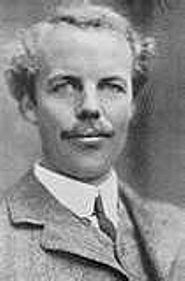Arthur Cecil Pigou facts for kids
Quick facts for kids
Arthur Cecil Pigou
|
|
|---|---|
 |
|
| Born | 18 November 1877 Ryde, Isle of Wight, England
|
| Died | 7 March 1959 (aged 81) Cambridge, Cambridgeshire, England
|
| Institution | University of Cambridge |
| Field | Welfare economics |
| School or tradition |
Neoclassical economics |
| Alma mater | King's College, Cambridge |
| Influences | Alfred Marshall, Henry Sidgwick |
| Contributions | Externalities Pigou effect Pigovian tax |
| Awards | 1899 Chancellor's Gold Medal 1903 Adam Smith Prize |
Arthur Cecil Pigou (/ˈpiːɡuː/; born November 18, 1877 – died March 7, 1959) was an important English economist. He taught at the University of Cambridge and helped shape its School of Economics. Many economists he taught went on to become professors around the world.
Pigou studied many areas of economics. He was especially known for his work in welfare economics. This field looks at how economic choices affect the well-being of society as a whole. He also studied business cycles, unemployment, and how governments manage their money (public finance).
Contents
Early Life and School
Arthur Pigou was born in Ryde on the Isle of Wight, England. His father, Clarence George Scott Pigou, was an army officer.
He earned a scholarship to Harrow School, a famous school for boys. He was the first modern head of the school. Today, Harrow School's economics club is named "The Pigou Society" in his honor.
In 1896, Pigou went to King's College, Cambridge, to study history. He won several awards for his writing and essays. He also became president of the Cambridge Union Society, a debating club.
He later switched to studying philosophy and ethics. This led him to economics, where he learned from Alfred Marshall. Pigou later took over Marshall's job as a professor.
Academic Work and Big Ideas
Pigou started teaching economics in 1901. He taught advanced economics to many students who became famous economists themselves. In 1902, he became a Fellow at King's College.
He focused on welfare economics. This area of economics tries to figure out how to make society better off. It looks at how decisions by people (like buying and selling) and businesses (like making products) affect everyone.
Understanding Externalities
One of Pigou's most famous ideas is about "externalities". He wrote about this in his book The Economics of Welfare (1920).
An externality is when someone's actions create a cost or benefit for others who weren't part of the original action.
- A negative externality is a cost. For example, a factory polluting the air creates a cost for people living nearby, even if they don't buy the factory's products.
- A positive externality is a benefit. For example, if your neighbor plants beautiful flowers, you get to enjoy looking at them, even if you didn't pay for them.
Pigou believed that negative externalities should be fixed with a special tax. This is called a Pigovian tax (or Pigouvian tax). The tax would make the person or company causing the externality pay for the harm they cause. He also thought positive externalities should get a subsidy (money from the government) to encourage them.
Today, the idea of externalities is very important in environmental economics. For example, many economists support a carbon tax (a type of Pigovian tax) to help fight climate change. This group is sometimes called the "Pigou Club".
Unemployment and Wages
Pigou also studied unemployment. In his book The Theory of Unemployment (1933), he looked at why people might not have jobs.
He talked about "sticky wages". This means that workers' pay doesn't change quickly when the economy changes. For example, if there's a recession, wages might not drop right away, which can make it harder for businesses to hire more people.
Pigou believed that some unemployment was "frictional" (people temporarily between jobs) or "voluntary" (people choosing not to work at the going wage). However, he also saw a new type of unemployment after World War I. This happened because businesses didn't need as many workers, especially women and soldiers returning from war. He suggested that the government could help by giving money (subsidies) to industries that were struggling.
Pigou and Keynes
Arthur Pigou and John Maynard Keynes were both famous economists at Cambridge. They were friends, even though they often disagreed on economic ideas.
Keynes wrote a very famous book called The General Theory of Employment, Interest and Money. In it, he often disagreed with Pigou's ideas about unemployment.
Pigou, however, later developed an idea called the Pigou effect. This idea suggests that the economy can fix itself more easily than Keynes thought. Pigou later said that he had come to appreciate some of Keynes's important ideas over time.
Personal Life
Pigou was a man of strong beliefs. During World War I, he was a conscientious objector. This meant he refused to fight in the war because he believed it was wrong to kill people. Instead, he drove an ambulance on the front lines for the Friends' Ambulance Unit. He even chose to do the most dangerous jobs.
He loved mountains and climbing. He introduced many friends to climbing. However, he developed a heart illness in the 1930s, which made it harder for him to climb.
Pigou retired from his professor job in 1943 but remained a Fellow at King's College until he died. In his later years, he became more private, often staying in his rooms. He never married.
See Also
 In Spanish: Arthur Pigou para niños
In Spanish: Arthur Pigou para niños
- Liberalism in the United Kingdom
Images for kids


